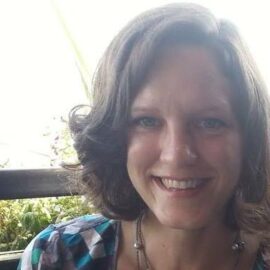How my story begins: I was healthy overall, but had high-risk HPV for a number of years. It didn't clear on its own. By 2018, it had progressed to CIN1. By the middle of 2019, I felt that something was wrong. My abdomen felt heavy and I just didn't feel "right." My doctor did another colposcopy and took samples but told me on the day she took the samples that she didn't see anything "particularly concerning." Then the samples were sent out for evaluation. I knew something was wrong when the office called and asked if I could come in that same morning. I arrived, but the doctor was delayed due to an emergency. I remember sitting there listening to muzak and trying to focus on a magazine. The doctor finally arrived and was blunt, but compassionate. I had cancer, she told me, and they thought it was small cell - a type that is very aggressive, with a poor prognosis. My doctor was as shocked as I was, but gave me hope that it was likely early stage. I was numb when I walked out. A second read of the biopsy gave me the incredible news that it wasn't small cell, it was squamous cell. My oncologist said "congratulations, you have garden variety cancer." I actually cried with relief.
How I felt after diagnosis: I was stunned and shocked for a while. I lived with the likelihood of having an aggressive small cell cancer for about a week, and actually thought about how I might want to spend my remaining time. I realized I didn't want to cross off a bucket list. Instead, I wanted to spend time outdoors and be with my family. With the better news, I took it one day at a time. When you're diagnosed, you have a slew of appointments and tests. It's exhausting, but it keeps you moving forward. Sometimes the news is good, sometimes it's not. But knowledge about exactly what you are dealing with is so much better than the confusion of the first few days and weeks!
Telling my family and friends: When and how to tell people was difficult. I just decided to initially tell only those close to me, then later made a public post once everything was confirmed. I had debated about sharing the news, but I was happy I did because I was overwhelmed with support and kindness.
My treatment: I had 25 rounds of external radiation, 5 cisplatin (chemotherapy), and 5 brachytherapy (internal radiation).
How I felt after treatment: I came through treatment amazingly well. My blood levels stayed high and I felt good on most days. Some of the chemo rounds knocked me out and I felt like I had the flu. After treatment I rebounded quickly, but I'm still overcome by fatigue sometimes. I was incredibly grateful that my side effects were minimal, but I know problems can surface years later.
What was most difficult for me: By the end, I had so many IVs and blood draws that my veins collapsed. They were hard and bruised. The doctors and nurses had to use an ultrasound to get the last two IVs in. I didn't expect that to be the hardest part, but it was painful.
What I did to help myself: I tried to keep up with yoga and meditation to help my body and quiet my mind. I continued walking my dog twice a day on most days. I also took it easy on myself and allowed myself to nap and sleep more. I tried to "set things down" and not take on too much. I chose not to "fight" my cancer. The cancer was a part of my own body. So I thought of it lovingly, but told it to move on!
My life after cancer: No one wants cancer, but oddly enough it offers a lot of gifts too. I'm more grateful for my life and the time I have. I've slowed down and don't let little things stress me out as much. I hope those changes last.
Where I am today: I'm only a month out from treatment, so I'm still waiting for my 3 month scans. In February 2020 I'll learn if the treatments worked. At my last MRI, the tumor was no longer visible, so I'm optimistic.
What I want other women to know: Stay current with your exams, and most of all, trust yourself. There were more details to my story that I didn't share. If I hadn't pushed my doctor, I'm not sure I would have been diagnosed at stage 1B2. When I was diagnosed she said "you knew something was wrong!" If you do have to deal with cancer, be assertive and informed. Find a doctor you trust. This person is your ally and can save your life, but you have to do your part too.
How I will try to help others: I'm on a few online support boards and try to offer help and encouragement to other women going through what I went through.
